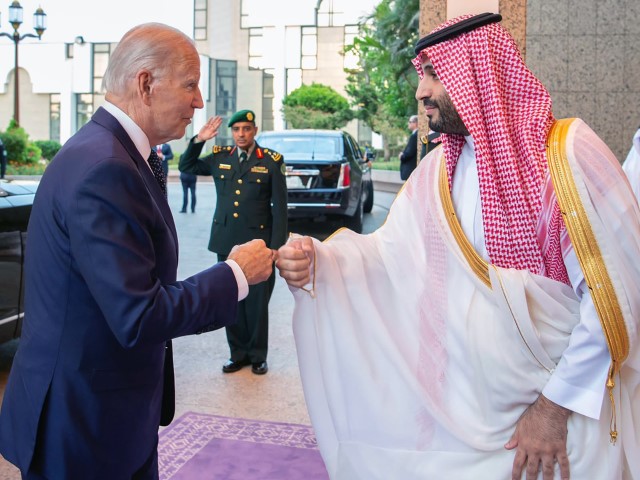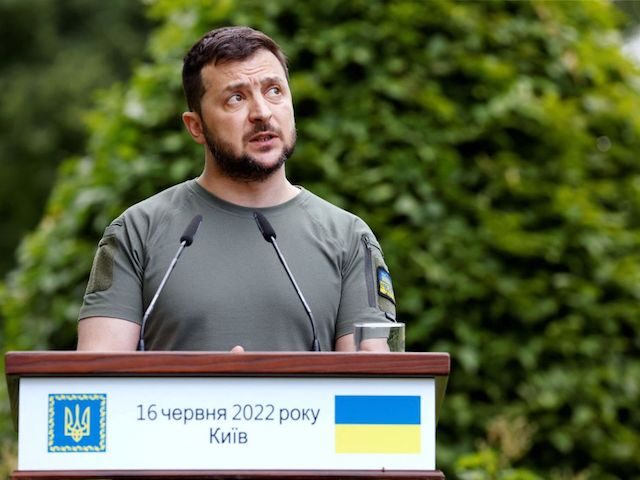Saudi Defense Minister Prince Khalid bin Salman pronounced himself “astonished” by the barrage of attacks from the Biden White House last week accusing Riyadh of siding with Russia in the eight-year-old invasion of Ukraine, citing Ukrainian President Volodymyr Zelensky’s kind words towards the country as contradicting Washington.
Tensions between leftist President Joe Biden and the monarchy of Saudi Arabia had been increasing for months, even in the face of Biden visiting Riyadh, greeting Crown Prince Mohammed bin Salman, and effectively returning Saudi Arabia to polite geopolitical society after a diplomatic freeze followed by the gruesome murder of Islamist Washington Post columnist Jamal Khashoggi at the hands of Saudi embassy employees.
The “fist-bump summit” went so poorly, according to a Wall Street Journal report, that Mohammed bin Salman dramatically reduced the amount he was planning to request OPEC+ increase its oil production by in response to Biden’s visit.
“In August, the Saudis had planned to push OPEC+ to raise oil production by 500,000 barrels a day in an effort to please Mr. Biden,” the newspaper claimed, “but Prince Mohammed ordered the increase lowered to a token 100,000 barrels a day after the Biden visit, the people inside the Saudi government said.”
The Biden administration confirmed last week that it had been pressuring Saudi Arabia to lead the OPEC+ oil cartel to increase production, or at least only modestly decrease it. Instead, OPEC+ announced a two-million-barrel-a-day production cut, prompting a wave of Biden administration accusations that Saudi Arabia was somehow attempting to aid Russia in the war by reducing the global oil supply.

In this photo released by Saudi Press Agency (SPA), Saudi Crown Prince Mohammed bin Salman, right, greets President Joe Biden, with a fist bump after his arrival in Jeddah, Saudi Arabia, Friday, July 15, 2022. (Saudi Press Agency via AP)
“Look, it’s clear that OPEC+ is aligning with Russia with today’s announcement,” White House press secretary Karine Jean-Pierre said following the early October production cut announcement.
White House spokesman John Kirby announced last week that Biden was planning to “reevaluate” the relationship with Saudi Arabia “in light of the OPEC decision, though Biden himself contradicted that statement later the same day, claiming he would wait until after the American midterm elections to decide on further action against Saudi Arabia.
The Saudi government expressed shock throughout the past week in response to the accusations, noting that it had maintained communications with Ukraine and kept neutral in the European conflict.
A week before the OPEC production cut, both the governments of Russia and Ukraine were thanking Mohammed bin Salman for his alleged role in brokering a prison swap that released hundreds of soldiers on both sides – and Americans who were captured fighting for Ukraine.
Ukrainian President Volodymyr Zelensky appeared to take the Saudis’ side in the conflict, despite billions in military funding from Biden, with an announcement on Friday that he had spoken to and “thanked” Mohammed bin Salman for aiding Ukraine.
“Spoke to Crown Prince of Saudi Arabia Mohammed bin Salman. Thanked for supporting Ukraine’s territorial integrity, resolution at the UN General Assembly,” Zelensky said, referring to a resolution condemning Russia that passed shortly before Biden officials began condemning Saudi Arabia’s alleged Russia ties. “We agreed to interact in the release of [Ukrainian] prisoners of war. We agreed on the provision of [Saudi] macro-financial aid to Ukraine.”
Zelensky announced the call after the Saudi Ministry of Foreign Affairs published an extensive rebuke on Friday to the Biden administration’s accusations calling the OPEC+ decision unanimous and necessary economically.
“The Government of the Kingdom of Saudi Arabia would first like to express its total rejection of these statements that are not based on facts, and which are based on portraying the OPEC+ decision out of its purely economic context,” the statement began. “Any attempts to distort the facts about the Kingdom’s position regarding the crisis in Ukraine are unfortunate, and will not change the Kingdom’s principled position, including its vote to support UN resolutions regarding the Russian-Ukrainian crisis.”
The statement also appeared to confirm a claim in the Wall Street Journal that the Biden administration had asked the Saudi government to postpone oil production cuts, which would raise gasoline prices in America, until after the November midterm elections.
“The Government of the Kingdom clarified through its continuous consultation with the US Administration that all econmic analyses indicate that postponing the OPEC+ decision for a month, according to what has been suggested, would have had negative economic consequences,” the foreign ministry claimed.
Kirby, the White House spokesman, later overtly confirmed this attempt to affect the November elections in a statement: “We presented Saudi Arabia with analysis to show that there was no market basis to cut production targets, and that they could easily wait for the next OPEC meeting to see how things developed.”
Defense Minister Prince Khalid bin Salman used Zelensky’s remarks to make a statement on Twitter on Sunday pointedly noting the difference between the Biden administration’s tone towards Riyadh and Kyiv’s.
“We are astonished by the accusations that the kingdom is standing with Russia in its war with Ukraine,” the defense chief wrote. “It is telling that these false accusations did not come from the Ukrainian government.”
Khalid bin Salman later added that among the countries in the OPEC oil cartel was not just Russia, but Iran, notoriously Saudi Arabia’s most prominent political rival. “Does this mean that the Kingdom is standing with Iran as well?” he asked.
Saudi King Salman bin Abdulaziz, widely believed to be a figurehead while Mohammed bin Salman handles day-to-day governance, delivered a speech on Monday addressing the oil production controversy.
“Our country is working hard within its energy strategy to support the stability and balance of global oil markets,” Salman said, adding that Saudi Arabia was spearheading dialogue efforts between Russia and Ukraine through the crown prince.

COMMENTS
Please let us know if you're having issues with commenting.